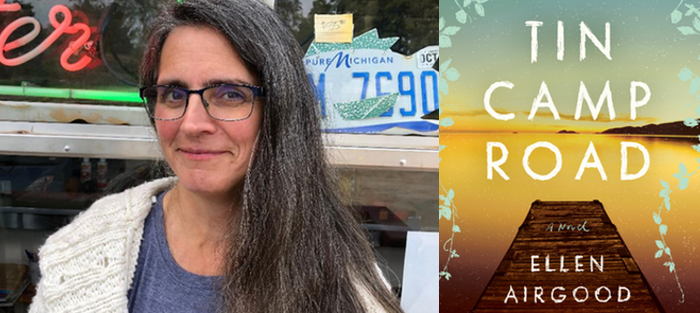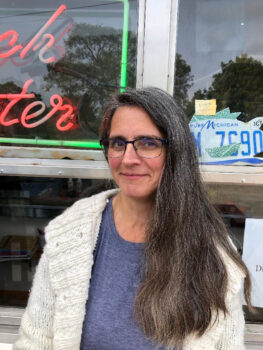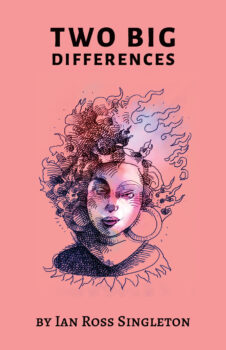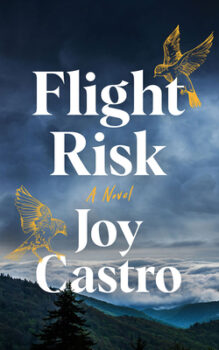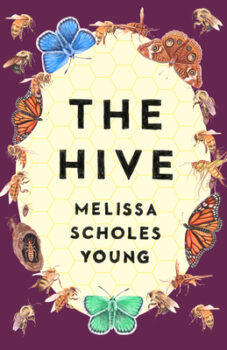Ellen Airgood and I met years ago at a diner she and her husband, Rick, own and run in Michigan’s breathtaking Upper Peninsula. She would serve breakfast to me and a writer friend on our annual excursions to the area. Years later, while reading her first novel, South of Superior, I pondered, “How does this hard-working person find the time to write about these complex characters with such skill and grace?”
Then I recalled what I tell aspiring writers: “If you want to become a writer, you won’t, but if you must become a writer, you will. It’s a calling.”
Airgood heard the calling at age ten, when she began to write poetry. But growing up on a farm in rural Michigan, she became fascinated by the beauty and wonder of her natural surroundings. Later, she earned her Bachelor’s at the University of Michigan’s School of Natural Resources. She graduated summa cum laude, a distinction that helped launch her early career in environmental science. Then one day, she wandered into a U.P. sandwich shop and met the person who would change her life trajectory. Now, the author says she learned everything she knows about writing from working in a diner.
In this new book, Laurel Hill, a young single mother who scratches out a living with a patchwork of jobs, lives in Michigan’s Upper Peninsula with her precocious, ten-year-old daughter, Skye. Tin Camp Road (Riverhead) is a warm, big-hearted novel about their struggles to overcome poverty and find a way to survive and thrive on the margins of society. It was my pleasure to talk to Ellen just before her book’s publication on August 3, 2021.
Interview:
Philip Caputo: You’re one of the busiest, hardest-working people I know. Up before the sun to bake muffins for sale at the diner you and your husband run; work the register and wait tables all day; close up, then drive twenty miles home. Wears me out just to think about it. How have you found the time and energy to write four novels?
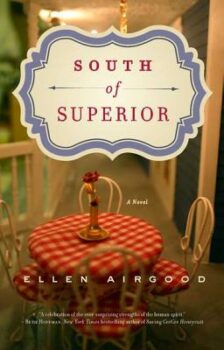 Ellen Airgood: Didn’t somebody say that in work lies man’s salvation? Or did I make that up to explain my own life to myself? But yes, our diner demands a great deal. When customers ask how I find the time to write, I usually tell them I don’t know. That’s the truth. But a fuller truth is that I’ve done most of my writing in the diner’s quietest months—Novembers and Aprils—and now in its off-seasons, since we’re no longer open in the winter. Plus, I write slowly. I worked on my first published novel, South of Superior, over the course of seven years. Same with Tin Camp Road.
Ellen Airgood: Didn’t somebody say that in work lies man’s salvation? Or did I make that up to explain my own life to myself? But yes, our diner demands a great deal. When customers ask how I find the time to write, I usually tell them I don’t know. That’s the truth. But a fuller truth is that I’ve done most of my writing in the diner’s quietest months—Novembers and Aprils—and now in its off-seasons, since we’re no longer open in the winter. Plus, I write slowly. I worked on my first published novel, South of Superior, over the course of seven years. Same with Tin Camp Road.
When things are going well, time rearranges itself and expands. That doesn’t happen often enough, but it’s a welcome occurrence when it does. And while the diner demands a lot, it gives a lot too. I’m sure my diner life helps me develop my characters. I listen to so many people; observe them; work with them; love them (mostly), ultimately. And the business with its ceaseless demands creates a need in me for refuge; writing has often been that refuge. It’s a way for me to have a life apart from the diner and is probably my own stab at immortality, which I think every human makes one way or another.
Bottom line, I guess it’s a matter of dogged determination, a doggedness that borders (crosses the border?) on dumb. All those hours spent pushing and pulling at sentences when I could have been knitting a sweater.
You have written young adult as well as adult novels. Do you find the transition from one genre to another difficult, or is it frictionless? For example, the relationship between Laurel Hill and her daughter, Skye, has strong echoes of similar relationships in your previous fiction; but most of the book is definitely aimed toward a mature audience, like the ambivalent feelings Jen and Laurel have toward one another.
I do find the transition pretty frictionless, as frictionless as writing gets for me, anyway. (Full disclosure: I often struggle to nail stories together.) A phrase that plods through my head on a regular basis is, “Words hard.” But as for the difference between writing adult and younger adult novels, I don’t really see one. In the diner, we always say my middle-grade books, Prairie Evers and The Education of Ivy Blake, are for ages eight to 108. I strive to write for and toward the essential truth of each character as well as I can. Kids’ issues and preoccupations are different than adults’, but they are just as riveting and real. Life is perplexing, nuanced, and full of challenges at every age.
I also always keep in mind that childhood has been redefined in our era and culture to go on for a long time, but that hasn’t always been the case. So, I don’t write down to kids or up to adults. I just write as well as I can to reveal the heart of each story.
Given its setting in northern Michigan, Tin Camp Road might be considered by some to be a regional novel. But I thought it reached well beyond its place to capture the lives of rural women, particularly single mothers with limited resources, in all parts of the country. Were you aiming for this universality or did it just turn out that way?
I’m just going to take a few moments to bask in that compliment. And to answer: I aimed at universality. With care and fierceness, I aimed. I’m beyond gratified that you feel I hit my mark. Your question makes me wonder if you think that classifying almost any literature as “regional” makes a lot of sense. Doesn’t any strong literature pay close attention to its setting?
Probably the label is just that, a label. And in fact, strong writing does pay close attention to its setting. Think Joseph Conrad—his rendering of the tropics is such that you can feel the sweat on your forehead while reading him.
I was alternately charmed and exasperated by Laurel. She sometimes seems her own worst enemy. I found myself agreeing with Jen’s sharp criticisms of her as someone who naively believes that things will end well, no matter what, and that her tendency to dream is dangerous. Did you have conflicting feelings toward Laurel while creating her?
Yes, I too was alternately charmed and exasperated by Laurel, and I did agree with Jen’s sharp criticisms at some level. Jen is harsh, but she is not completely wrong. (Also, she isn’t completely right. The book asks the question, but it doesn’t provide the answer.) Her accusation that dreamers are dangerous echoes my own infuriated attack on myself, at times. I am as guilty as Laurel of certain ridiculous, impractical choices, and I make them over and over; sometimes I just want to shake myself. I place a high premium on kindness and humility, though, and that’s where I think Jen went awry. Her essential frustrations with Laurel, though, are valid.
Laurel’s uncertainty was a big challenge as I dealt with her. She’s so insecure, it’s a burden. It’s an important part of the story, however. More affluent people may not know how readily that kind of doubt infects people living in poverty, maybe especially women. But it comes with, like egg rolls with a combo platter. And her pride, which was also a stumbling block, is vital to her. It’s her only real currency, or so she believes.
Skye, on the other hand, is an uncomplicated child, essentially good-natured. How much did you draw on your earlier, young adult novels in bringing her to life?
Skye. Pausing to smile here. So easy to hang out with and write. She keeps showing up in my work in different guises. She brought herself to life, as did Prairie Evers. They are the easiest, most natural writing I ever do. Though it’s not conscious, I’m sure I draw on the awesome children I’ve had the pleasure of knowing in my diner life, as well as on some aspects of my own childhood. I was a grubby, outdoorsy kid surrounded by dogs, horses, cornfields, woods, mucky ponds, books, and family. Prairie and Skye probably reflect the best parts of the young me who was so blessed.
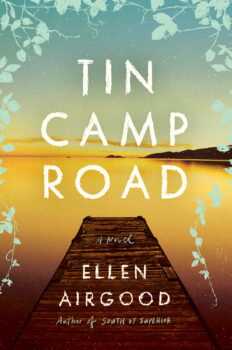 Referring back to place and this book’s locale, many American writers from Twain to Faulkner, from Sherwood Anderson to Willa Cather, mined small towns and rural settings for their characters and themes. Would you say that this has become a neglected province in our national literature? I’d read somewhere that eighty percent of our 330 million people live on just twenty percent of the land.
Referring back to place and this book’s locale, many American writers from Twain to Faulkner, from Sherwood Anderson to Willa Cather, mined small towns and rural settings for their characters and themes. Would you say that this has become a neglected province in our national literature? I’d read somewhere that eighty percent of our 330 million people live on just twenty percent of the land.
First, thank you for evoking those towering names in this discussion. Second, that’s an interesting statistic. The numbers alone imply that rural settings and themes are a neglected province. Waiting on visitors in our diner in Grand Marais, a tourist destination on Lake Superior, I often hear, “It’s a different world up here.” It’s usually said with a sense of wonder and delight, though sometimes not. Either way, I agree. It is a different world, one I want to share, to record, and save at some level. I think it’s vital that readers hear from this corner of the world. It’s a unique place, full of strong characters and unexpected details. This place and its people brim with complexity, heart, and fortitude. It matters to me that readers have a chance to experience it. I want to ask, because you’ve seen and written about so much of the world and so many situations: Do you think it’s a neglected province?
I think it is, mostly because we are, and have been for a long time, an urban/suburban society. The lives of rural men and women are alien to most readers. That is, stories about them don’t resonate in our culture the way they once did. Take me, for example. Born in 1941, grew up in the 50s, mostly in suburbia; but I knew a few things about rural or small-town life, took up hunting at age fourteen, worked in canneries in Wisconsin, etc. And I was typical. I doubt that’s true today of young men and women in the burbs.
I was impressed by the simplicity, clarity, and grace of your prose. It often reminded me of Louise Erdrich, another modern writer who focuses on the upper Middle West, albeit on its Native Americans, the Ojibwe in particular. I noticed a couple of references to the Ojibwe in Tin Camp Road, Ojibwe words like Ninoondezgade. Have you read much Erdrich? If so, fair to say she has been an influence for you?
Thank you so much for the compliment and the comparison to Louise Erdrich. I’ve read most of her work, beginning with Love Medicine, when I was in college. I was captivated, carried away. Toted my battered trade paperback around just about everywhere for years; bought a second copy to lend out, not willing to risk not getting my own copy back. Yes, she’s been an influence. I admire and appreciate her writing. Her eye and aim are true. Her settings are vivid; her characters complex and riveting; her prose powerful and poetic.
As for the Ojibwe characters and references in Tin Camp Road, they appeared on their own and I welcomed them enthusiastically, delighted they’d see fit to drop in. The Ojibwe are among the only—the only(?)—tribal people not removed from their ancestral lands when the Europeans arrived on this continent. Their presence here in the north is strong, vibrant, and integral. A scene that didn’t end up in the book has Ojibwe store owner Naomi commenting that her great-great grandmother’s cooking fire was situated on the same property where Naomi now lives. An idea like that fascinates and pleases me.
Your comment and question prompt my own. I love your work. I’d love to know what writers have had strong influences on you.
To a limited extent, Hemingway, Stephen Crane, Siegfried Sassoon, James Jones; to a very great extent, Joseph Conrad. I also admire, practically worship, Willa Cather. But she has not influenced my own work, except to set a standard I know I’ll never come close to meeting.
I hear you. I feel that way about Willa Cather too. And Tolstoy. You chuckled at me once (kindly) for pining after a skill like his. But aim high, right?
Here is a question I hate being asked, but I’ll ask it of you nevertheless: Why did you write this book?
Sitting at my laptop listening to rain beat on our tin roof, I first come up with facetious answers: Nothing on TV the last seven years. Ran out of knitting yarn. (A lie.) Then I pause, grimace, and sigh. Okay, I’ll try to answer. Apparently, I’m driven to write. Driven beyond the bounds of rationality. (See Question #1.) It must help me make sense of the world and my life. Sometimes there is no inspiration you can point to, but rather a need to be working. Once I began Tin Camp Road, I felt compelled to say something about the working poor and parenthood. I wanted to communicate that the lives of the working poor are nuanced, lively, and immediate and that characters flying and working under the radar are full of wonder, grit, and creativity. They are as bursting as anyone with bad habits, amazing character strengths, grief, joy, exasperation, dreams. (And I want anyone who relates to Laurel to hold fast to those dreams. No matter what Jen—who is still not wrong—says.) I wanted to convey how easily self-doubt comes along with poverty, and to say something about happiness, too, or at least to ask questions about it. What is it? How do you grab it? How do you let it go so it can swim up again?
Much of writing this book was rough sledding. But the characters made me keep going. I was committed to them; they reminded me of people I love, admire, and have learned from, and I wanted to help them have a voice, even if I often thought, “Man, guys, you so should have chosen a stronger, more experienced writer.” Plus, there was my own question to myself. I have often felt I could not truly be myself away from here. Is that true? The book wonders the same question, and dodges the answer by having its heroine find a way to stay.
Finally, I felt a sense of urgency that people connect to their world, whether it’s a city street or a wild lakeshore. I think of Betty Smith’s A Tree Grows in Brooklyn, Alfred Kazin’s A Walker in the City, anything at all by Joseph Mitchell. We can connect anywhere, and must.
A comment rather than a question: Although Laurel is urged by her friends, Jenny especially, to move to someplace like Traverse City, where she can have a “real job in a real place,” she elects to stick it out with Skye in the Upper Peninsula’s wilderness. I thought of Thoreau’s observation that in wildness lies our salvation. Care to comment on the comment?
Thoreau, I don’t know, man. He was always going into town to have dinner with his friends. Which I get! And sympathize with. He was right to go. But, yes, I do believe that in wildness lies at least a slice of our salvation. The wild world is a real world, one less mediated, less safe, and thus more alive.
My question to you: You write clear, strong, compelling prose set in Michigan’s largely wild Upper Peninsula, as well as in other of the world’s wild places. What do you think of Thoreau’s assertion?
Keeping in my mind that he not only went into town to dine with friends but also brought his laundry to his mother, I think his statement is largely true. I frequently flee to wild country for the very reason you cite—it’s more alive. It’s more essential now to our salvation than it’s ever been because of the damnation wrought by technology and our obsession with gizmos. I am amazed, and disheartened, by how artificial American lives are in these times.
Yeah. Me too.
Are Laurel, Skye, Jen, and the other characters modeled on, or inspired by, real people? Or did they spring entirely from your imagination?
Yes. And yes.
So, how does it work for you, if there is any one way? Are your characters sometimes based on real people?
Sometimes. I have a character in my 2005 novel, Acts of Faith, modeled on a bush pilot I knew in Africa, Dale Roark. His fictional avatar, Wesley Dare, is so close to him that Dale’s mother, when she read the novel and saw that Dare dies, started weeping and asked Dale, “Why did he kill you?” But other characters are more or less spun from the whole cloth. I find that the longer I live, the more experience I have with life, the deeper is the imaginative well I can draw from.
I love that! It’s very encouraging. Actuarial tables predict I could easily live to ninety-eight, so I’ll keep digging that well.
My experience over the years has been that the characters I conceive of when I begin a book change as the work progresses. It’s a little weird and very wonderful — they don’t exist in reality but it’s as though they acquire a life and will of their own. Those moments are exciting and make the writing of a novel, which is a helluva lot harder than people think, worth the effort. Was that your experience with Laurel, Skye, etc.?
Yes, exactly my experience. The characters may start as an idea in my head, and sometimes may be loosely based on someone I know, but as I work, they become themselves. (The same thing happens with experiences and plot points.) The characters come to seem to me like real spirits tromping around in the world.

